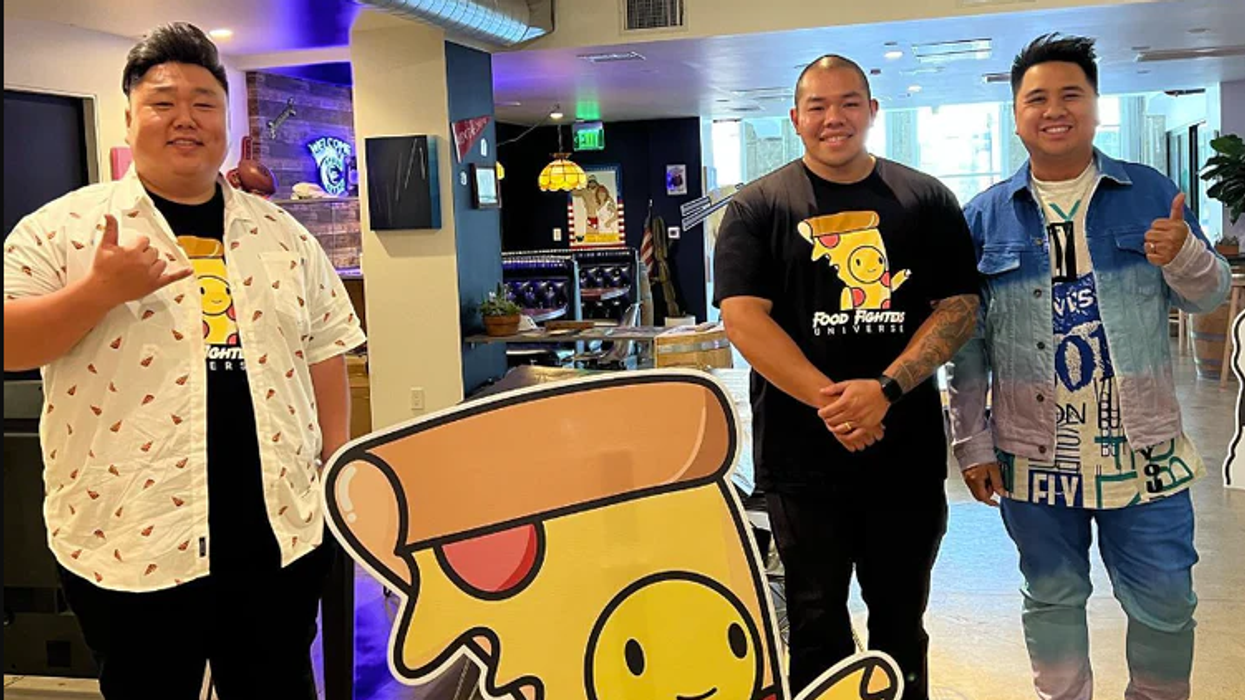Long Beach’s NFT-Themed Restaurant Still Accepts Crypto For Now
Samson Amore is a reporter for dot.LA. He holds a degree in journalism from Emerson College. Send tips or pitches to samsonamore@dot.la and find him on Twitter @Samsonamore.

The “crypto winter” might be rolling in, but the founders of Food Fighters Universe are staring the storm in the face and boldly claiming now is actually the time to double down on digital assets.
Food Fighters Universe, which bills itself as the first NFT-themed restaurant group, was started just four months ago by co-founders Andy Nguyen, COO Phillip Huynh and “chief megaphone” Kevin Seo.
The restaurant does still accept crypto, despite a recent Los Angeles Times article where a reporter described visiting the site and said staff weren’t accepting Ethereum or ApeCoin, the cryptocurrency linked to Bored Apes. Nguyen and Seo told dot.LA the reporter just happened to visit the store when their systems were temporarily down for maintenance, and said they’re still taking crypto as payment.
“It was timing and miscommunication,” Seo claimed. “[The LA Times] happened to stop by when we were in NYC doing an activation with Bored & Hungry and we were accepting crypto payments in New York and there was a technical issue on the west coast we were unaware of.”
“The best time to accept crypto is in a bear market, that’s when you make your most money,” said Nguyen, a restaurateur known best for his involvement in Los Angeles’ Afters Ice Cream chain.

Seo told dot.LA the restaurant plans to accept more forms of crypto as payment in coming months. And though the co-founders wouldn’t disclose the restaurant’s revenue, Seo noted they had plans to open a second Bored & Hungry location in Seoul, South Korea this fall—the store’s first international expansion.
It’s important to note that accepting crypto isn’t the only thing that makes Bored & Hungry a web3-adjacent enterprise: the restaurant’s theme is based around Bored Ape Yacht Club, the controversial NFT collection from Yuga Labs.
Celebrities like Paris Hilton, Jimmy Fallon, Tom Brady and Seth Green have openly endorsed the apes, while critics (like web designer and Azaelia Banks’ ex-boyfriend Ryder Ripps) claim the project is rooted in racism or Nazi iconography – something Yuga Labs CEO Nicole Muniz strongly denies.
“I think it's just he said, she said, people digging,” Nguyen said when asked about the allegations. “[Bored Ape] is the most popular brand out there, it is what it is.”
In creating the restaurant, Nguyen had to meet the Bored Ape founders and spoke with one of them (he didn’t say which one) to get their official endorsement, and added, “he didn’t seem crazy.”
Despite the unsavory accusations and impending crypto crash, the series of 1,000 humanoid ape cartoons is quite possibly the most popular NFT brand out there, with sales surpassing $1 billion earlier this year. That’s why Nguyen and his team chose to purchase three Bored Ape NFTs earlier this year for roughly $330,000 and theme their Long Beach hamburger joint around them.
The price floor for Bored Ape Yacht Club’s NFTs continues to fluctuate. After peaking at a high of roughly 149 Ethereum in early May, the project is now down to 81.75 ETH. Decrypt reported in June the collection dropped 47%, falling below a $100,000 floor price for the first time since August 2021.
Nguyen said the desire to link with the Bored Ape brand was rooted in its widespread appeal.
“We are going to be gunning for the top 10 [most] popular coins out there,” Seo told dot.LA, while acknowledging the percentage of people actually purchasing their lunch with crypto is still miniscule.
“Adoption is still going to take a long time,” Seo said. “We're going to continue to push it, even though it's being used very minimally. It's not a huge percentage of anything. Some folks want to do it and just having the option feels good, and we hope that that will lead to more adoption.”
- Miso Robotics Partners With AWS To Test Its Kitchen Robots - dot.LA ›
- Cameo Adds a Bored Ape to Its Celebrity Video Platform - dot.LA ›
- Crypto House on Sale in North Hollwood for $1.2M - dot.LA ›
- NFT Restaurants Reservations Let You Own A Restaurant Table - dot.LA ›
- NFT Restaurants Reservations Let You Own A Restaurant Table - dot.LA ›
Samson Amore is a reporter for dot.LA. He holds a degree in journalism from Emerson College. Send tips or pitches to samsonamore@dot.la and find him on Twitter @Samsonamore.





 Image Source: Skyryse
Image Source: Skyryse